
Anno 201 - 300

|
Popes on Parade Anno 201 - 300 |
POPshop |
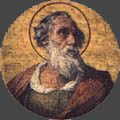 |
Saint ZephyrinusAnno 198-217 |
An Italian. Uneducated, with a weak mind and a weaker personality, Zephyrinus did nothing to stop the spread of heresy. His contemporaries were so disgusted with his lack of spine after the moxie of Victor that they took to calling him names. The only disagreement amongst the Church Fathers was what sort of horrible Zephyrinus was exactly; Hippolytus (the furture antipope) called him "ignorant and greedy", whereas Callistus (the future Pope Calixtus I) preferred "unlearned and unskilled". So nice he could bring people together this way. And this guy is a saint why? |
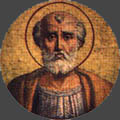 |
Saint Calixtus IAnno 217-222 |
An Italian, his name means "very handsome". Calixtus was perhaps the first true scoundrel elected Pope. He was born a slave to a Christian named Carpophorus, a member of the Imperial household. After he embezzled a considerble sum of money, Calixtus' escape was foiled when the authorities discovered him in the hold of a cargo ship. He was condemned to death. The Christian community of Rome pleaded with Carpophorus to commute Calixtus' death sentence. Eventually (and mostly to get some peace and quiet) Carpophorus gave in, but he placed the untrustworthy slave under close watch. Winner of the AD 187 prize for "most creative suicide attempt" for his effort to single-handedly storm a Roman synogogue in an effort to escape the short leash of Carpophorus, Calixtus was sentenced to hard labour in the mines of Sardinia. After just a few years, Marcia (the Christian concubine of Emperor Commodus) arranged for his release, and he spent several peaceful years in Antium, a "guest" of Pope Victor. Calixtus, having mended his ways, was appointed Archdeacon by Zephyrinus and recalled to Rome. As Pope, he mostly tried to stay out of trouble. |
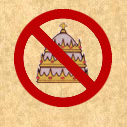 |
Saint Hippolytus(Antipope) |
It says something about Calixtus that his election was the first seriously disputed election in Papal history. A large number of Roman Christians rallied around the scholar Hippolytus and proclaimed him bishop instead. A formidible theologian and caustic personality, Hippolytus proved a thorn in the side of the next several Popes. Still, there's something to be said for talking truth to power, and after his death in the persecutions of Maximinius Thrax in 236, Hippolytus was canonised. |
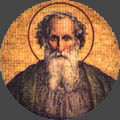 |
Saint Urban IAnno 222-230 |
An Italian from Rome. Almost nothing is known about him, though he spent much of his pontificate struggling against the barbs of Hippolytus. |
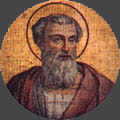 |
Saint PontianusAnno 230-235 |
An Italian from Rome. As Pope, Pontianus ran afoul of Emperor Maximinius Thrax. The Emperor (a traditionalist in this regard) decided to assuage his anger by ramping up a general persecution of Christians. Both Pope Pontianus and (anti)Pope Hippolytus were arrested and deported to the Sardinian mines. Noting a distressing number of "mining accidents", Pontianus correctly determined he wasn't going to be making it back to Rome, except perhaps in a pine box. In 235, he became the first Pope to resign his office. He died about a year later, a martyr. |
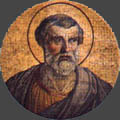 |
Saint AnteriusAnno 235-236 |
A Greek. Anterius was elected Pope after the resignation of Pontianus. He died six weeks later in the continuing persecutions in Rome, reportedly for daring to collect the records of the martyrs and deposit them in the archives of the Roman Church. |
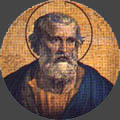 |
Saint FabianusAnno 236-250 |
An Italian from Rome. Fabian was not among the frontrunners during the papal election. In fact, no one had considered him at all. During the deliberations, however, a dove flew in through an open window and landed on Fabian's head. The clergy knew a sign when they saw one, and they elected him by acclamation. The Roman persecutions tapered off after the death of Emperor Maximinus Thrax, giving Fabian time to put the affairs of the dioscese of Rome in some sort of administrative order. He initiated some tidying up of the Christian cemetaries and even arranged to have Pontianus' body brought back from Sardinia. Despite having a fabulous name, Pope Fabian was not the luckiest of pontiffs. When Decius became Emperor in 249, he made it his mission to slay the Christians. Fabian was arrested and killed shortly thereafter. |
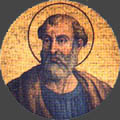 |
Saint CorneliusAnno 251-253 |
An Italian from Rome. The persecutions of Decius were bothersome enough that it took 14 months for the Roman Christians to choose Cornelius as a very reluctant Pope. A small group of dissatisfied clergy and three duped bishops (all of whom later recanted) elected the scholar Novatian instead. The western bishops rallied around Cornelius, and Novation's bid went nowhere. Cornelius was exiled to Civita Vecchia during a new wave of persecutions under the Emperor Trebonianus Gallus, and he died there a martyr. |
 |
Novation(Antipope) |
An eloquent scholar, elected by a close group of his personal friends. Following Cornelius' death, Novation's followers still couldn't persuade rest of the Roman clergy (nor a single bishop anywhere in Christendom for that matter) to support their guy. Despite maintaining a high profile, he somehow managed to survive the persecutions of Emperor Trebonianus Gallus. St. Cornelius suggested he had been possessed by Satan while in the catechumenate. It would certainly explain a lot. |
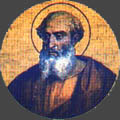 |
Saint Lucius IAnno 253-254 |
An Italian from Rome, the son of Porphyrius. Pope Lucius had the misfortune of being elected during the persecutions of Emperor Trebonianus Gallus. He was soon exiled from Rome, but he returned with the accession of the Christian-friendly Emperor Valerian. The Romans loved Lucius, and they greeted him with unrestrained joy upon his return. Except, apparently, for Novation and his small group of followers, who pretended not to notice. |
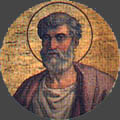 |
Saint Stephen IAnno 254-257 |
An Italian from Rome, the son of Jovius. Archdeacon to Pope Lucius, who favoured him as his successor, Stephen strongly asserted the primacy of the Pope throughout his pontificate, often loudly and without much subtlety. The African Church, dominated by St. Cyprian, had taken to rebaptising former heretics who wanted to rejoin the Church. Stephen told them in no uncertain terms (he was quite rude, actually) that rebaptism was not to be done. Rather, they should be granted absolution and welcomed back. The war of words escalated to the point where Cyprian railed at the Pope, "what blindness of mind, what depravity!" The two saints died unreconciled to each other, but in later years St. Augustine, St. Jerome, and St. Vincent of Lérins all praised Stephen's firmness, if not his tact. |
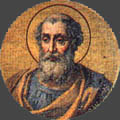 |
Saint Sixtus IIAnno 257-258 |
A Greek. The name Xystus means "shaved". Sixtus was by all accounts a diplomat, and he spent much of his pontificate mending fences with the vast array of bishops Stephen had insulted. It's a tribute to the force of Stephen's personality that this was for Sixtus practically a full-time job. Sixtus had the additional problem of becoming Pope just as the Emperor Valerian was ramping up a full-bore persecution of the Church, particularly the hierarchy. Sixtus and four of his deacons were beheaded while he was preaching a sermon in the Praetextatus cemetary in Rome, which couldn't have been good for morale. |
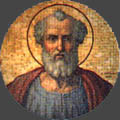 |
Saint DionysiusAnno 259-268 |
Possibly a Greek, Dionysius first appears in the historical record as an "excellent and learned" presbyter under Pope Stephen. Due to the ferocity of the persecutions, the election could not be held for nearly a year, until news of the Emperor Valerian's death abroad reached Rome. The new Emperor, Gallienus, issued a toleration decree, and Dionysius and his deacons breathed a huge sigh of relief. Apparently they were fond of their heads and wanted to keep them attached. As Pope, Dionysius recovered the Church properties siezed during the persucutions. He called a synod at Rome in about 260 to condemn the Sabellian heresy. He even ransomed Christian slaves in Cappadocia from the marauding Goths (more on them in a couple of centuries...) |
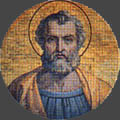 |
Saint Felix IAnno 269-274 |
An Italian from Rome. Almost everything known about Pope Felix turn out, on closer inspection, to be dead wrong. He was long thought to be a martyr, but research reveals that an ancient chronicler got his name mixed up with a completely different Felix. There were some decrees attributed to him, but upon closer examination these proved to have been written by somebody else. Once all the apocryphal information is stripped away, we're left with pretty much just a name on a list and a possible burial site. Kind of sad, really. |
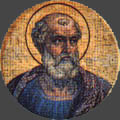 |
Saint EutychianusAnno 275-283 |
An Italian from Tuscany. As little as we know of Felix, we know even less about Eutychianus. The Church was free of persecution and largely free of heresy during his pontificate, so he couldn't have been too horrible. |
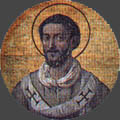 |
Saint CaiusAnno 283-296 |
See Eutychianus, above, only more so. We don't even know where Caius was born. The pontificates of these three Popes, Felix, Eutychianus, and Caius, were the calm before the unleashing of the Diocletian storm. |
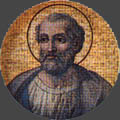 |
Saint MarcellinusAnno 296-304 |
Little is known of Marcellinus, except that he had the misfortune of being Pope when, in 303, the Emperor Diocletian co-signed the order of his subordinate, Augustus Galerius, to begin the most thorough and destructive persecution of Christians throughout the Roman Empire. Thousands of people were slaughtered. Churches were demolished, books and records were burned, and all making use of a court of law were required to burn incense to the gods or suffer death. Tradition has it that Marcellinus broke down, bowed to the imperial command, and offered incense in court. Condemned for his apostasy, he was deposed. He repented prior to his execution, however, and died a martyr if not a Pope. How much of this story is true is anybody's guess, as the ancient historians were very cagey about Marcellinus. Many of them simply left him out of their histories. Eusebius, the "Father of Church History", only has one (rather mysterious) mention of Pope Marcellinus: "the persecution also affected him". |
Complete List of Popes
First Century |
Second Century |
Third Century |
Fourth Century |
Fifth Century
Sixth Century |
Seventh Century |
Eighth Century |
Ninth Century |
Tenth Century
Eleventh Century |
Twelfth Century |
Thirteenth Century |
Fourteenth Century |
Fifteenth Century
Sixteenth Century |
Seventeenth Century |
Eighteenth Century |
Ninteenth Century |
Twentieth Century
Twenty-First Century
Ecumenical Councils | Papal Box Scores